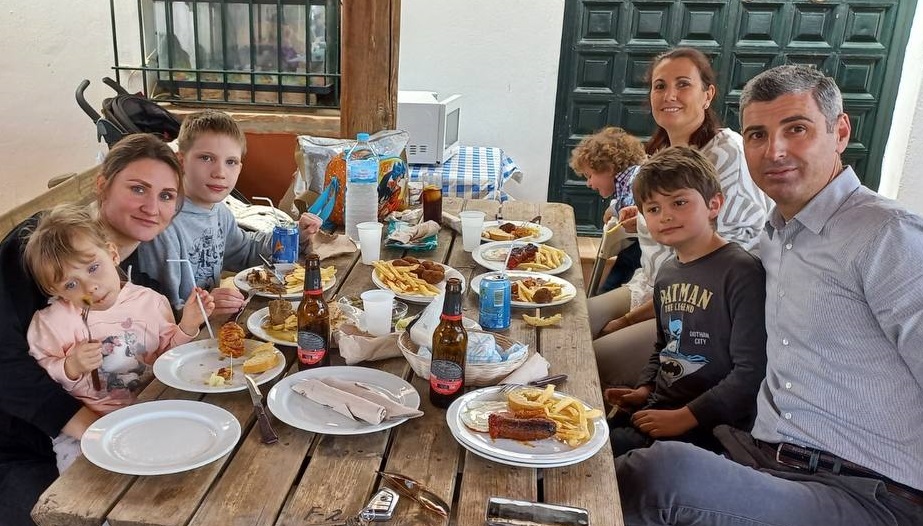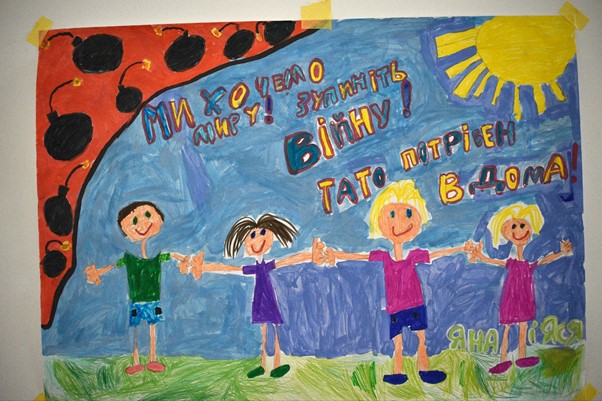Conversations with Ukrainians at a shelter for women in Lviv
In search of safe haven, seeking shelter from the war
June 21, 2022
A displaced woman from Sloviansk (right) hugs a UNDP worker (left) in a UNDP-supported temporary shelter, Lviv, Ukraine.
The war in Ukraine is now one of the worst emergencies in the world, causing the fastest forced population movement since the Second World War. More than a quarter of the population – close to 14 million Ukrainians– are now displaced, over seven million of them within the country. Many are women and children, who are subject to safety hazards, lack of housing and basic necessities, loss of income, psychological trauma, gender-based violence, human trafficking and much more.
Since the very first day of the war in February, 68-year-old Liubov Maksymovych, a civil activist and head of the UNDP-supported Women’s Perspectives Center NGO in Lviv, Western Ukraine, and her colleagues have collaborated with local volunteers to help find safe shelters for women. Aside from necessities such as food, clothing, medicine, hygiene products and temporary shelter — women also receive psychological and legal help, and advice how to avoid human trafficking.
“The war started when I was at the train station in Kyiv, on a business trip,” said Maksymovych. “At 6 am I heard explosions. As I arrived in Lviv I immediately started receiving dozens of very similar requests: ‘there’s a woman with a child coming’, ‘evacuation is needed’, ‘they need a place to stay’, ‘they are terrified, help!’”
Liubov Maksymovych, a civil activist and head of the UNDP-supported Women’s Perspectives Center NGO in Lviv, Western Ukraine.
“We are just doing whatever we can to help them feel safe. People come very traumatized” — Liubov Maksymovych
Just after the start of this war, Maksymovych’s NGO received a grant from UNDP and Denmark to support a temporary shelter for vulnerable women and children fleeing violence, which she set up with the help of a local business. The entire team supporting the shelter is made up of 10 people: project coordinators, therapists, support hotline operators, and an accountant.
“The concept behind the shelter was that people come here for a layover of one or two days to decide if they are going abroad or staying in Ukraine,” said Maksymovych, adding that the biggest challenge for the women is restoring a sense of personal security and peace of mind. She said it is also difficult for them to find a job or way to earn their livelihoods.
A strong focus of Maksymovych’s organization is also protecting displaced women and children from becoming victims of human trafficking. The risk of trafficking in persons as well as sexual exploitation and abuse in Ukraine and the region as the number of vulnerable people fleeing the war continues to rise. While cases of human trafficking are less likely to be identified in the immediate aftermath of mass displacement, initial reports from within and outside of Ukraine indicate the potential for traffickers to exploit the vulnerabilities of those fleeing the war.
"If women decide to leave Ukraine,” said Maksymovich, “they attend a lecture on how to avoid human trafficking in a foreign country.”
Maksymovych said in the first two months of war more than 400 women and 200 children passed through the shelter. Most of them came from Kharkiv, Bucha, Irpin, Kramatorsk, Sloviansk, and Kherson. People learn about the shelter through a network of women’s support groups and organizations.
“We have women here who can distinguish different kinds of incoming missiles just by their sound. That time when a missile hit Lviv we had 15 women here. Everyone heard the explosion and could see the smoke. The very next day they all crossed the border and left, and we helped them.”
“Back then we didn’t realize the tragedy we were heading for, we didn’t want to believe it.” – Tetiana from Mariupol
Tetiana and Serhii from Mariupol have stayed at the shelter for longer than anyone else. The only thing left of their bombed apartment is the pair of keys they have with them. “On the 24th of February the outskirts of the city were bombed,” they said, preferring not to reveal their last names. “The very next day everything took a dramatic turn for the worse. There was chaos at stores and ATMs. Back then we didn’t realize the tragedy we were heading for, we didn’t want to believe it would get worse.”
Serhii and Tetiana said the next few weeks were a living hell for the people from Mariupol. They lost access to water, and food stocks were depleting fast. Getting even basic medicine was next to impossible. “We drained water from the pipes so that we could wash our hands. Drinking water became a luxury item,” they said.
Tetiana and Serhii, survivors from Mariupol, share their story in the UNDP-supported shelter in Lviv.
The next chapter began on 16 March. An artillery shell hit their apartment, instantly rupturing the kitchen and the bathroom, causing a fire to break out. Tetiana decided to evacuate on the 21st of March. By word of mouth they learned about evacuation buses just 700 meters from the basement where they were hiding. Somehow, even with a broken arm and leg, they managed to evacuate. They’ve spent a month at the shelter and it has helped them return them back to life, but now they have nowhere to go.
“I can’t wait for us all to return home and start rebuilding our future.” – Iryna from Kharkiv

Iryna, 34, from Kharkiv with her two children (left) and her host family (right) in Spain.
Iryna, a 34-year-old mother from Kharkiv, lived with her husband, two children and parents in an apartment block in North Saltyvka, which has suffered more than any other neighbourhood in Kharkiv.
As soon as the first explosions knocked the windows out of her home she realized it was time to go. She and her children scrambled towards the train station amidst incoming explosions and spent 20 hours on an overcrowded evacuation train. But when she finally arrived at Liubov's shelter she couldn’t believe her eyes: food, therapists, hot showers, and even massages.
After 10 days in the safe house, she and he children left for Spain where a family took them in. Every day she feels intense survivor's guilt for leaving her hometown behind in this time of war. “I constantly wait for my husband’s texts just to know he is fine,” she said. “He is a construction worker and I can’t wait for us all to return home and start rebuilding our future.”
Staying in touch
Liubov Maksymovych stays in touch with all women she has helped to ensure they are safe after leaving the Women’s Perspectives Center. After they depart, each displaced person fills in a questionnaire, sharing what they liked most about the safehouse. They’ve accumulated over 200 such forms by now. “These words show the real value of our work,” exclaimed Maksymovych . “Now that we have donor funds we can afford to financially support our team, purchase basic necessities and even expand! We will be able to equip three shelters for seven, 30, and 40 persons each, all fit for long-term stays. The long-term plan is to even expand to five safehouses, all just to give more women and children the opportunity to feel safe and start a new life.”

Child’s drawing with the statement: “Stop the war. My Dad is needed at home.”
NGO “Women's Perspectives Center " belongs to the CSO hubs’ network, supported by the United Nations Development Programme in Ukraine with the financial support from the Ministry of Foreign Affairs of Denmark.

 Locations
Locations